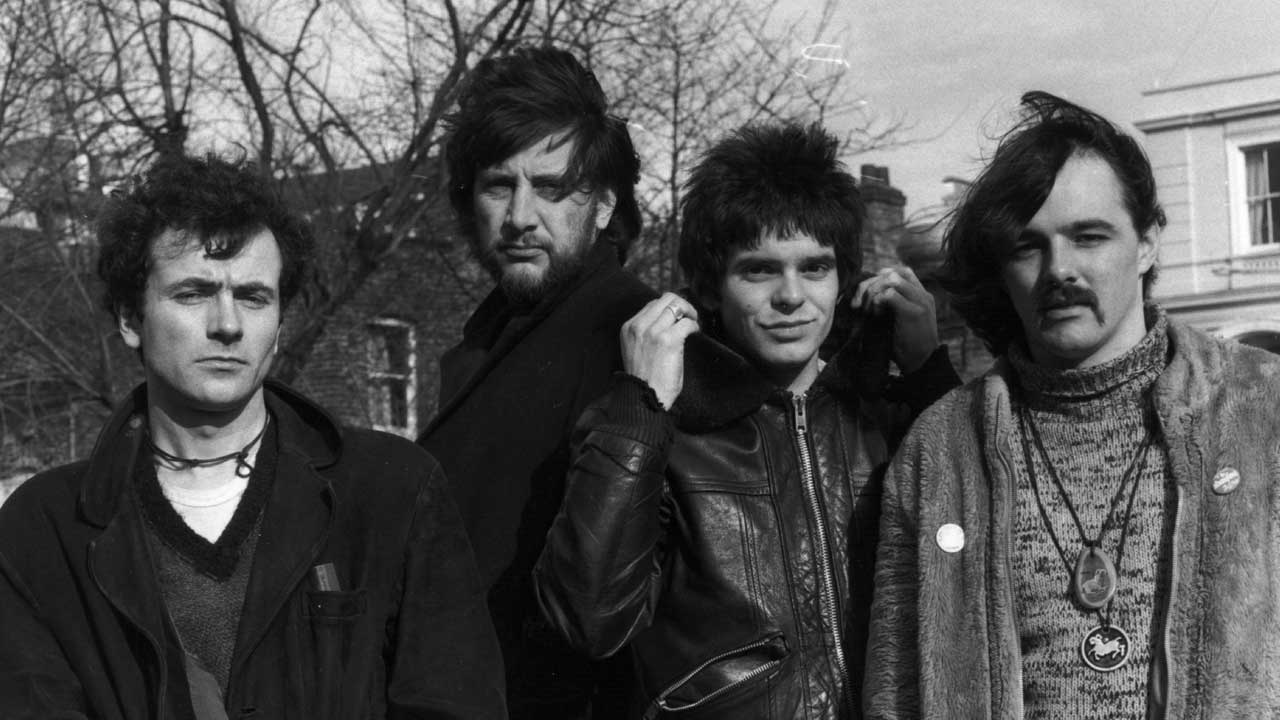"Peaches is voyeuristic, but it's not misogynistic": The meaning behind The Stranglers' controversial classic Peaches
Driven by a gritty bass riff, The Stranglers' Top 10 hit Peaches is nearly 50 years old, but it's still a must-play by today’s version of the band

Select the newsletters you’d like to receive. Then, add your email to sign up.
You are now subscribed
Your newsletter sign-up was successful
Want to add more newsletters?
There had been voyeuristic songs before, of course, but when it arrived a decade after Andy Williams’s chaste and breezy 1967 single Music To Watch Girls By, The Stranglers’ 1977 hit Peaches was something else again. Lecherous and horny, a boorish beach party’s worth of lust funnelled into four filthy minutes, the band’s second single wouldn’t be their last song to court controversy/draw accusations of sexism. On purely musical terms, however, Peaches was genius. A gutsy slab of punk and cod-reggae, it remains incredibly hooky.
Adopting a belt-and-braces approach, United Artists Records released it as a double A-side with Go Buddy Go. But, like the Sex Pistols’ God Save The Queen, Peaches soon fell foul of The BBC censor, which banned it on grounds of indecency. Perhaps it was the single’s cover art depiction of a peach in pink bikini briefs, or maybe it was the anatomical antics that had frontman Hugh Cornwell codifying the word ‘clitoris’ as ‘clitares’ as the song’s narrator ogled female sunbathers.
Either way, the Beeb disapproved. Taken from The Stranglers’ 1977 debut album Rattus Norvegicus, Peaches was very much in character. Rattus was a ballsy, irreverent record knee-deep in vermin and sewers; offensive almost by design.
Hugh Cornwell, Jean Jacques Burnel, Jet Black and Dave Greenfield had formed the band in Guildford, Surrey in 1974. Rising up via endless gigging on the UK’s raucous and rowdy pub-rock circuit – and travelling in an ice-cream van salvaged from a fleet of such vehicles Black had owned previously – they were accused of hitching a ride on punk’s coat-tails. The truth, though, was that these self-styled Men In Black were properly, distinctively ‘punk’ in attitude before the UK strain of the movement even had a name.
True outsiders with an unsavoury reputation for being ‘handy’ with their fists, the group emerged as a strange but potent mix of brutality and sophistication, crudeness and intelligence.
“There was a lot of rejection initially, so we had to develop this kind of ghetto mentality,” bassist Jean Jacques Burnel says today. “It didn’t help that we didn’t follow the general dictates of punk. We’d say we liked The Doors and people would give us stick for it. Or they’d say we were too sophisticated because of Dave’s incredible keyboard playing. It pissed us off, because that whole idea of punk being ‘year zero’ was bollocks. Every band has influences whether they admit it or not.”
Burnel’s meaty, overdriven plectrum bass on Peaches provides the song’s main hook. Indeed, it’s so iconic that in 2022 a Guitar World magazine poll rated it “The 4th best bassline of all time”. Burnel came up with the riff at The Stranglers’ Chiddingfold, Surrey squat, and Greenfield later doubled its melody on Hammond organ. The roots of the song’s inspiration went further back, however.
Sign up below to get the latest from Classic Rock, plus exclusive special offers, direct to your inbox!
United Artists had bought The Stranglers out of a brief, unlikely-fit deal they’d had with reggae label Safari Records. The label switch was amicable, and, later recalling that the band had their own gear for live work, Safari’s owner Reg McClean asked to borrow The Stranglers’ PA for an all-day dub reggae/ sound system event in London.
“So we turned up with it, and Reg gave us a few quid,” Burnel recalls. “It was me, Hugh and my then-girlfriend Choosey Susie [as immortalised in the Rattus Norvegicus song of the same name]. I remember us being in this huge hall. There was a big spliff going round but we got none of it [laughs]. “The music was incredible and we soaked it up. It had this [dub-reggae artist] King Tubby feel with loads of room for the bass, and guys scatting or rapping over the top. You can hear that Peaches was our attempt to write something like that, even though it’s not ‘proper’ reggae as such. We were the first of the punk bands to attempt that kind of crossover.”
On May 26, 1977, when The Stranglers made their debut on Top Of The Pops, they played Go Buddy Go, not Peaches. No matter that the single edit for the latter had substituted the word ‘bikini’ for ‘clitares’ (sic), the BBC still wasn’t having it. How does Burnel feel today about the charges of misogyny levelled against Peaches?
“Haven’t you ever looked?” he says, smiling. “It’s human nature whether you’re male or female, gay, straight or whatever. Peaches is voyeuristic, but it’s not misogynistic.”
Peaches was not the first – or last – rock song to make fruity, peach-specific allusions. “Every time I’m in Georgia, I eat a peach for peace,” guitarist Duane Allman replied when asked about the title of the Allman Brothers’ 1972 album Eat A Peach.
A somewhat dubious explanation from a member of a band renowned for their hell-raising? Perhaps. In 1996, another song titled Peaches, this one a No.8 UK hit for the Presidents Of The United States Of America, also seemed loaded with sexual innuendo. Asked about this, singer Chris Ballew talked of squeezing peaches that had fallen from a tree while he was high on LSD, and this being the song’s inspiration. Yeah, right.
The Stranglers’ Peaches has retained its cultural currency via various sources. Burnel, the son of French restauranteur parents, was doubtless delighted when it became the closing theme for chef Keith Floyd’s gastronomic TV shows for the BBC (instrumental only, natch), and the track also plays over the opening titles of Jonathan Glazer’s 2000 film Sexy Beast, which, in an alarming reversal of bikinigirl voyeurism, depicts a sweaty Ray Winstone in briefs.
Hugh Cornwell left The Stranglers in 1990. Dave Greenfield died in 2020 and Jet Black died in 2022. Burnel continues to co-front The Stranglers today, and when the band played their first UK date of 2025 at Lincoln Castle on June 13, Peaches was on the setlist.
James McNair grew up in East Kilbride, Scotland, lived and worked in London for 30 years, and now resides in Whitley Bay, where life is less glamorous, but also cheaper and more breathable. He has written for Classic Rock, Prog, Mojo, Q, Planet Rock, The Independent, The Idler, The Times, and The Telegraph, among other outlets. His first foray into print was a review of Yum Yum Thai restaurant in Stoke Newington, and in many ways it’s been downhill ever since. His favourite Prog bands are Focus and Pavlov’s Dog and he only ever sits down to write atop a Persian rug gifted to him by a former ELP roadie.
You must confirm your public display name before commenting
Please logout and then login again, you will then be prompted to enter your display name.


